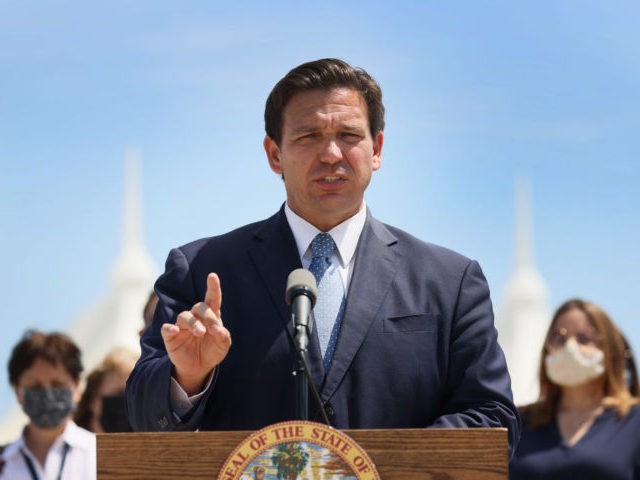The Florida State Legislature moved one step closer to a ban on the private funding of election administration in the state earlier this month.
Florida’s comprehensive election reform bill, HB 7041, contains a very specific prohibition of the controversial practice of private funding of election administration first introduced in the 2020 general election by non-profit groups funded by Facebook founder and CEO Mark Zuckerberg and his wife, Priscilla Chan.
The language prohibiting such private funding is very clear in Section 97.106 of the bill, “Prohibition on use of private funds for election.”
No agency or state or local official responsible for conducting elections, including, but not limited to, a supervisor of elections, may solicit, accept, use, or dispose of any donation in the form of money, grants, property, or personal services from an individual or a nongovernmental entity for the purpose of funding election-related expenses or voter education or registration programs.
The bill easily passed out of the House Appropriations Committee in a 17 to 8 vote on April 9, and was taken under consideration by the State Affairs Committee last Wednesday. It appears to be on a path to passage in both houses of the Florida State Legislature prior to the end of its current session on April 30.
Gov. Ron DeSantis (R-FL) has indicated his strong support for the bill, and is expected to sign it into law if it is approved by both houses.
According to a staff analysis of the bill completed by the Florida House of Representatives staff, the bill also addresses several other election integrity issues:
It increases security in elections by:
- Improving security and reliability of registration records and voter changes; requiring signature matches be to a signature less than 4 years old or the most recent wet signature registration records; and eliminating voter solicitation of any kind within 150 feet of polling places, or drop box site.
- Improving security and integrity of vote-by-mail (VBM) requests; requiring better monitoring of all VBM drop boxes; and making it a misdemeanor for anyone to possess VBM ballots without authorization.
It increases transparency by:
- Requiring all election records be retained 22 months
- Requiring name on VBM [Vote by Mail] return envelopes; requiring a record of identity of designees requesting VBM ballots for another; recording the address to which VBM ballots are mailed; requiring supervisors to report on uncounted VBM ballots received; and
- Requiring publication of canvassing board members on official website and each board meeting notice.
It improves election administration by:
- Clarifying that Party Executive Committee role in filling district and circuit nomination vacancies;
- Extending time allowed for the Department of State to validate new voting equipment and consolidates certain post-election reports; and
- Prohibiting private funding of official election activities.
As Breitbart News reported in December:
A report released by the Amistad Project of the Thomas More Society at a press conference on Wednesday alleged Facebook founder Mark Zuckerberg and his wife made $419.5 million in contributions to non-profit organizations during the 2020 election cycle–$350 million to the “Safe Elections” Project of the Center for Technology and Civic Life (CTCL) and another $69.5 million to the Center for Election Innovation and Research–that, “improperly influence[d] the 2020 presidential election on behalf of one particular candidate and party.”
“The 2020 presidential election witnessed an unprecedented and coordinated public-private partnership to improperly influence the 2020 presidential election on behalf of one particular candidate and party. Funded by hundreds of millions of dollars from Facebook founder Mark Zuckerberg and other high-tech interests, activist organizations created a two-tiered election system that treated voters differently depending on whether they lived in Democrat or Republican strongholds,” Amistad Project Director Phill Kline wrote in the report’s executive summary.
In Florida, the Zuckerberg-funded Center for Technology and Civic Life provided grants for election administration in the November 2020 election to 12 Florida counties, including Broward, Miami-Dade, and Hillsborough, but has yet to disclose the amount of those grants.
Florida’s proposed ban on the private funding of election administration contained in HB 7041 is similar to a complete ban on such funding that was signed into law by Arizona Gov. Doug Ducey (R-AZ) earlier this month.
Georgia’s Election Integrity Act, signed into law by Gov. Brian Kemp (R-GA) on March 25, prohibits county registrars from accepting private funding, but allows county governments and the state government to accept such funding.
As Breitbart News reported:
Arizona Secretary of State Hobbs, a Democrat, was one of the state election officials in 23 states who accepted monies from the Zuckerberg-funded Center for Election Innovation and Research (CEIR), as Breitbart News reported in November. The Secretary of State in eight of those states was a Republican, including Georgia, where Secretary of State Brad Raffensperger accepted a “large grant” from CEIR.
A subsequent report from the CEIR indicated it gave more than $5 million to the office of Georgia’s Secretary of State and more than $4 million to the office of Arizona’s Secretary of State for election administration in the November 2020 election. The state of Florida received $287,000.
In Wisconsin, the State Senate passed a bill earlier this month that would prohibit county and municipal governments from accepting private funding for election administration, but allows the Wisconsin Election Commission to accept such private funding provided that it is distributed equally around the state on a per capita basis.

COMMENTS
Please let us know if you're having issues with commenting.